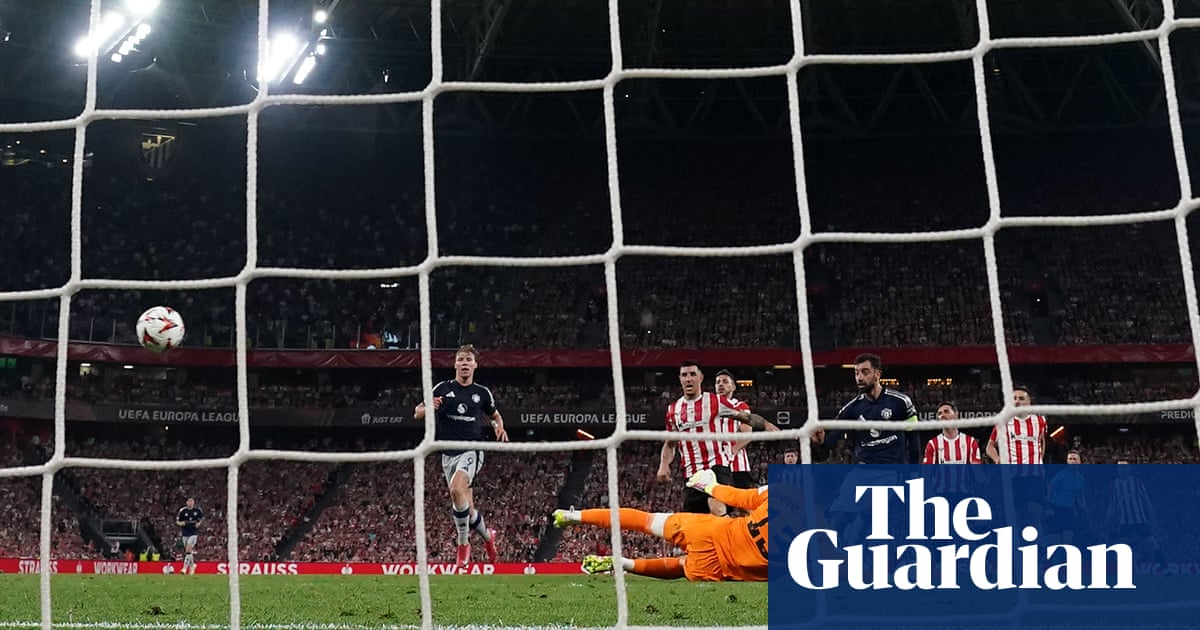Manchester United enjoyed their night in Bilbao so much that they will surely be coming back. They remain the only unbeaten team among the more than 100 that have played in the Europa League over eight long months, and even if they do fall to a first defeat in seven days’ time, they should be there on its final game in this same stadium, this season given meaning and potentially a triumphant end.
They came to the stadium everyone calls the Cathedral and defeated Athletic Club so convincingly that the second leg carries little threat. No one had won here this year in this competition and Athletic had conceded just 10 times in all competitions; United scored three in a quarter of an hour.
An opening goal from Casmeiro and two from Bruno Frenandes, the first of those from the spot and accompanied by a red card for Dani Vivian, destroyed the dreams of the faithful here and virtually ensured that they will return on 21 May against Spurs or Bodø/Glimt.
Ultimately this was an efficient, impressive performance in which United looked something like the team, and club, they are supposed to be: one that can win a European title that has become their salvation and a glimpse, perhaps of future hope, not least as it would give them Champions League access. One that ended up looking on a different level to their opponents.
Athletic had started strongly too, forcing the first corner and the first roar inside 90 seconds. While United sought to slow the game down, the home side wanted to accelerate. United’s possession was not so much a platform for them to do something as for Athletic to, ready to asphyxiate their opponents, rob and then go at them. That front-footed approach, though, did open them to the ball behind and just four minutes in, Manuel Ugarte slipped into the right channel and released Alejandro Garncho who scored what he thought was the opener. That was offside, but it was also a warning, an invitation to United to seek the same wing.
It would work too and repeatedly. André Onana had to save from Alex Berenguer, Iñaki Williams headed just over and, when he then raced up the right and pulled back, Victor Lindelof twice had to make decisive interventions. The second of those, made almost on the line with Berenguer shooting from five yards out, really should have been the opener. Instead, having resisted the pressure, the red and white shirts coming at them, it was United that would get it just before the half hour.
It was made by United’s unlikely hero doing unlikely things. More unlikely even than last time, although the moment was not as dramatic. Harry Maguire, the emergency striker who hadcompleted the most astonishing comeback against Lyon, smacking in a header on 121 minutes to send Old Trafford wild, now went all Stanley Matthews to momentarily silence San Mamés. If that had been latter-day Ronaldo, this was more like his teenage incarnation.
Faced by Mikel Jauregizar, Maguire went up the right, stopped, turned one way and the next, then started up again, going past the midfielder and delivering the cross. Ugarte headed it on and, at the far post, Casemiro arrived to nod into the net. United had a lead that was swiftly doubled, and in a way that gave them even more of an advantage than the goal they scored, two minutes enough to virtually terminate the tie.
Again, it started on the right, where United had always identified opportunity. When the ball from Noussair Mazraoui came across the six-yard box, Rasmus Højlund went down. Vivian went straight to him and accused him of diving but the defender was protesting too much and if he had got away with it the first time ultimately he would pay for what he had done; Højlund may have been quick to go to ground but there had been a clear hand on his shoulder and when the referee Espen Eskås came back from the VAR screen where he was shown what he had not seen live, he pointed to the spot and pulled out a red card.
Sign up toFootball Daily
Kick off your evenings with the Guardian's take on the world of football
after newsletter promotion
Vivian departed, Fernandes rolled in the penalty and this, it seemed, was done. Williams did bend a shot wide but Athletic appeared gone and United added a third. Højlund scrambled for the ball, Ugarte provided the clever flick and Fernandes ran through to finish high into the net. The lead might even have extended still further before half-time, when Mazraoui smashed one off the bar.
The protests and the feeling of injustice which accompanied them off at the break increased early in the second when the referee was called to the screen to have another look at the moment when Maguire pulled down Maroan Sannadi. He decided that was no red card, any tiny hope that the numbers might be evened out, and a comeback would start, snuffed out. Instead, United controlled this, never in any danger. They managed it with a certain comfort, a sense of clear superiority, and the threat – if not an actual need – of extending the lead still further. There was another penalty appeal from Højlund, this time tangling with Yuri Berchiche. Ugarte and Casemiro both took aim from distance and the Brazilian put a header against the post.
Williams went sprinting up the pitch soon after, but Athletic were exhausted now, defeated, and those chances were a reminder that this could still get worse. For United, it could hardly get any better, and they will surely be back.
